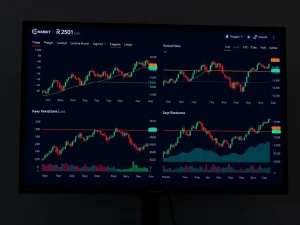Alarming Precedent: DOJ Considers Criminal Charges Against Dragonfly Capital Over Tornado Cash Link

The cryptocurrency world is abuzz with an unprecedented development that could redefine the landscape for venture capital in the digital asset space. The U.S. Department of Justice (DOJ) is reportedly considering criminal charges against Dragonfly Capital, a prominent venture capital firm, and its managing partner, Tom Schmidt. This potential legal action stems from Dragonfly’s 2020 investment in PepperSec, a company later linked to the controversial cryptocurrency mixer, Tornado Cash. This is not just another headline; it’s a stark warning shot across the bow for every investor and innovator in the crypto realm, signaling a new era of accountability.
The Unfolding Tornado Cash Investigation and Its Ripple Effects
The spotlight on Dragonfly Capital emerged during the ongoing trial of Roman Storm, a developer associated with Tornado Cash, who faces serious charges including conspiracy to commit money laundering and sanctions violations. Prosecutors revealed their deliberations regarding Dragonfly and Schmidt during a recess, underscoring the severity and breadth of the government’s pursuit of accountability in the crypto sector. Tornado Cash, a privacy-enhancing tool, has been at the center of a storm due to its alleged misuse in facilitating illicit transactions, including those by sanctioned entities. The DOJ’s strategy appears to be expanding beyond the direct operators of such tools to encompass early-stage investors, creating a new layer of risk for venture capital firms.
This development is significant because it suggests a shift in regulatory approach. Historically, legal action has primarily targeted the creators or direct users of illicit tools. However, by scrutinizing early investors, the DOJ is signaling a broader interpretation of liability, aiming to hold stakeholders accountable for the downstream applications of their funded projects. This could fundamentally alter how due diligence is conducted in the crypto venture capital space.
Dragonfly Capital Charges: A “Dangerous Precedent”?
The potential criminal charges against Dragonfly Capital and its managing partner have sent shockwaves through the venture capital community. Dragonfly’s managing partner, Qureshi, has publicly defended the firm’s investment, emphasizing their belief in U.S. citizens’ privacy rights and their cooperation with investigations since 2023. He voiced a strong concern that prosecuting investors for the misconduct of their portfolio companies could establish a “dangerous precedent.”
This sentiment resonates deeply within the tech and investment communities. If investors become criminally liable for how their portfolio companies’ technologies are *misused* by third parties, it could stifle innovation, particularly in areas like privacy-enhancing technologies that inherently possess “dual-use” capabilities. These tools can be used for legitimate privacy protection, but also for illicit activities. The legal challenge will be defining the extent of an investor’s responsibility and intent when their capital indirectly contributes to problematic outcomes.
The implications of such a precedent are vast:
- Chilling Effect on Innovation: Venture capitalists might become overly cautious, shying away from funding projects with any perceived compliance ambiguity, even if they offer significant technological advancements.
- Redefining Due Diligence: Investment firms would need to implement even more stringent and forward-looking due diligence processes, attempting to foresee potential misuses of technology years down the line.
- Legal Ambiguity: Courts will face the complex task of establishing criminal intent or complicity for investors who did not directly operate the technology or interact with malicious actors.
Intensifying Crypto Regulatory Scrutiny on All Fronts
The potential action against Dragonfly Capital is part of a broader trend of intensifying crypto regulatory scrutiny from U.S. authorities. Regulators are increasingly focused on closing loopholes in sanctions enforcement and deterring funding for projects that could facilitate financial crimes. This proactive enforcement approach signals a shift from reactive measures to preemptive strikes against the ecosystem surrounding controversial crypto projects.
This heightened scrutiny isn’t limited to mixers. It extends to DeFi protocols, stablecoin issuers, and even NFT platforms, as governments globally grapple with how to regulate a rapidly evolving, decentralized financial landscape. The DOJ’s current stance suggests that merely providing capital, even without direct operational involvement, could now carry significant legal risks if the funded entity is later found to be involved in illicit activities. This means that the entire lifecycle of crypto projects, from initial funding to deployment, is now under the regulatory microscope.
Navigating the Complexities of Venture Capital Crypto Investments
For venture capital firms operating in the crypto space, the Dragonfly case serves as a critical wake-up call. The lines between fostering innovation and enabling illicit activity are becoming increasingly blurred in the eyes of regulators. Investing in cutting-edge blockchain infrastructure, particularly privacy tools, now requires an even more nuanced understanding of regulatory frameworks and potential liabilities.
What does this mean for future venture capital crypto investments? Firms will likely:
- Increase Legal & Compliance Teams: Bolster their internal legal and compliance departments with experts specifically versed in crypto regulations and international sanctions.
- Enhanced Risk Assessments: Conduct more rigorous risk assessments, not just on financial viability but also on the potential for dual-use technologies to be exploited.
- Proactive Engagement with Regulators: Seek clearer guidance from regulatory bodies and potentially engage in dialogue to shape future policy, rather than reacting to enforcement actions.
- Focus on Compliant Infrastructure: Prioritize investments in projects that explicitly build compliance features into their core design, even if it means sacrificing some degree of decentralization or privacy.
The debate over Tornado Cash itself highlights the tension between technological innovation and regulatory compliance. While proponents argue for the necessity of privacy tools for user data protection, critics emphasize their misuse by criminals. Dragonfly’s investment, initially seen as a strategic bet on blockchain infrastructure, now exemplifies the significant regulatory risks inherent in funding projects with ambiguous compliance profiles.
The Broader Implications of DOJ Crypto Enforcement
The potential criminal charges against Dragonfly Capital represent a significant escalation in DOJ crypto enforcement efforts. This case, if pursued, could establish a landmark precedent, holding investors criminally liable for the downstream use of their capital. It aligns with broader governmental efforts to close perceived loopholes in sanctions enforcement and to deter the funding of projects that facilitate financial crimes. This move signals a more aggressive stance from the DOJ, aiming to send a clear message across the entire crypto ecosystem.
The legal and practical implications, however, remain uncertain. Courts will need to navigate the complexities of proving intent and complicity in cases involving decentralized technologies. How does one prove that an investor, years prior, intended for their capital to be used in a way that violated sanctions, especially when the technology itself has legitimate uses? The outcome of the Roman Storm trial, and any subsequent action against Dragonfly, will undoubtedly shape future investment patterns and regulatory approaches in the privacy-focused technology sector.
This ongoing saga is a stark reminder that the crypto industry, despite its decentralized ethos, is increasingly subject to traditional financial regulations and legal frameworks. The future of innovation in this space will heavily depend on finding a balance between technological advancement and robust compliance.
Frequently Asked Questions (FAQs)
Q1: Why is the DOJ considering charges against Dragonfly Capital?
The DOJ is evaluating criminal charges against Dragonfly Capital due to its 2020 investment in PepperSec, a company that later became associated with the cryptocurrency mixer Tornado Cash. Tornado Cash has been implicated in facilitating money laundering and sanctions evasion, leading to increased regulatory scrutiny on entities linked to it, including its early investors.
Q2: What is Tornado Cash, and why is it controversial?
Tornado Cash is a cryptocurrency mixer designed to enhance transaction privacy by obscuring the origin and destination of funds. It became controversial because, while it has legitimate privacy-preserving uses, it was also allegedly exploited by cybercriminals and sanctioned entities to launder illicit funds, prompting U.S. Treasury Department sanctions.
Q3: What does this mean for other venture capital firms investing in crypto?
This development signals a significant increase in regulatory risk for venture capital firms investing in the crypto space. It suggests that investors could be held accountable for the downstream misuse of technologies they fund, particularly those with dual-use capabilities. This will likely lead to more stringent due diligence, increased legal compliance, and a potential shift in investment focus towards projects with clearer regulatory profiles.
Q4: Who is Roman Storm, and how is his trial related?
Roman Storm is a developer of Tornado Cash who is currently on trial facing charges including conspiracy to commit money laundering and sanctions violations. The information regarding the DOJ’s consideration of charges against Dragonfly Capital and Tom Schmidt was disclosed by prosecutors during a recess in Storm’s ongoing trial, indicating the interconnectedness of these legal actions.
Q5: What is the “dangerous precedent” mentioned by Dragonfly’s managing partner?
Dragonfly’s managing partner, Qureshi, warned that prosecuting investors for the misconduct of their portfolio companies could set a “dangerous precedent.” This implies a concern that such actions could stifle innovation by making investors overly risk-averse, particularly concerning projects that offer privacy-enhancing technologies but could potentially be misused by bad actors.
Q6: Will this affect privacy-focused crypto projects?
Yes, this could significantly impact privacy-focused crypto projects. Venture capital firms might become hesitant to invest in such projects due to the increased legal risks, potentially slowing down innovation in privacy-enhancing technologies. Projects in this space will likely need to demonstrate robust compliance mechanisms from their inception to attract funding.









